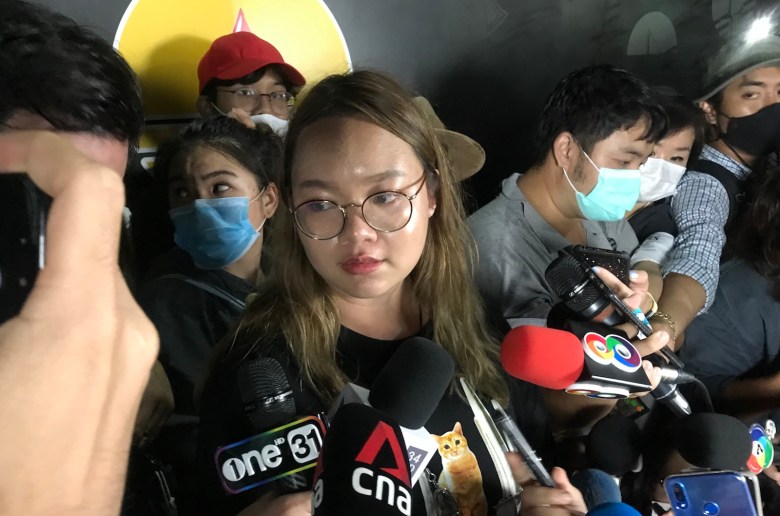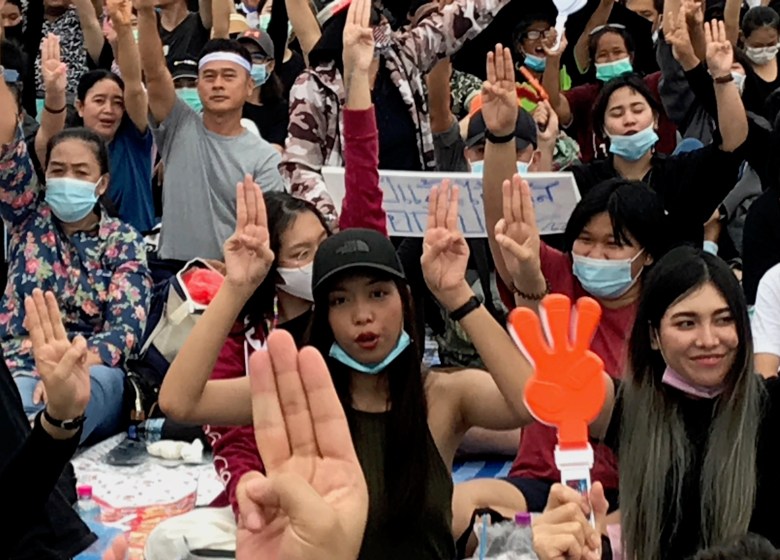BANGKOK – When Panusaya Sithijirawattanakul read out 10 demands for monarchal reform in a midnight September 19 speech on a protest stage mounted on sacred royal grounds overlooking Bangkok’s Grand Palace, the tens of thousands of protesters in attendance loudly cheered every provocative point.
The speech reprised the student leader’s now historic August 10 speech at her Thammasat University, where she called for a clearer division between royal and public assets, a reduction in the national budget allocated to the monarch, abolition of various royal offices, and, fittingly, revocation of laws that bar and severely penalize any criticism of the king.
Her midnight speech, made under stormy skies and with a brightly lit, soldier-protected royal palace in the background, was spiced with allegations of royal misconduct that drew laughs, gasps and cheers from demonstrators of all ages nominally gathered to protest the anniversary of a 2006 military coup and the armed forces’ enduring political role.
As a protest punctuation mark, Panusaya and other activists embedded a “people’s” plaque at the royal park on Sunday, symbolically replacing another one that commemorated the end of absolute monarchy in 1932 that was mysteriously removed and replaced with a pro-royal cap in 2017 at a royal ground near King Maha Vajiralongkorn’s personal palace.

The plaque was removed by police on Monday. Earlier in the day, a group of protesters submitted a letter with the 10 royal reform demands to the Supreme Court, marking an escalation of their campaign.
Panusaya’s United Front of Thammasat and Demonstration student protest group insists that its demands do not aim to topple the monarchy, led by the centuries-old Chakri dynasty, but rather aim to check and modernize it as suitable in a democracy. Under Vajiralongkorn’s young reign, royal power has arguably grown at the expense of its prestige.
Vajiralongkorn, who resides mainly in Germany and is known as Rama X, has moved firmly to consolidate royal power that had arguably grown diffuse in the waning years of his father’s 70-year reign. That has been seen in moves to bring elite military units under his personal command and taking control of royal assets that were previously managed in part by the Ministry of Finance.
It’s unclear how much the royal purse and how much the state will finance Vajiralongkorn’s palatial building plans, including what are expected to be expansive and grand new palace grounds that, if finished as designed, will dwarf in size and splendor of his deceased father’s former personal Chitralada palace in the heart of Bangkok.
Yet it’s lost on few observers that the royal reform calls are being sparked during a historic economic downturn, with the kingdom’s Covid-hit economy on track to contract 8% in 2020, similar to the Great Depression economic conditions that softened the ground for King Prajadhipok’s soldier-led overthrow in the name of “people’s power” democracy in 1932.
Prime Minister Prayut Chan-ocha, a royalist ex-coup-maker who steered the royal succession from widely revered King Bhumibol Adulyadej to Vajiralongkorn, now finds himself on the horns of a crucial dilemma, one that will likely define his legacy as both a staunch royalist and democratically elected leader.
Prayut’s government has implored protesters to refrain from royal criticism at their demonstrations, which since July have centered mainly on calls for his coalition government’s dissolution and fresh elections, constitutional reforms of a military-drafted charter and an end to the harassment of their affiliated student dissidents.

By his previous coup government’s authoritarian standard, Prayut’s clampdown on protesters has been light, not heavy, with activists accused of sedition rather than lese majeste consistently released soon after being detained. One government insider says it’s a kid-gloves move to avoid giving the student movement added ammunition.
At the same time, Prayut’s core elite royalist constituency is baying for him to do more to protect the crown’s prestige from the rising anti-royal rhetoric which, if allowed to swell, could threaten a wide range of political and big business family interests that have invested heavily, if not slavishly, in loyalty to Vajiralongkorn’s crown.
One government insider claims that Vajiralongkorn recently advised the government to “let the children be” when recently briefly in-country to preside over national Queen Mother’s Day ceremonies on August 12 – two days after Panusaya made her initial rally cry for royal reforms.
But as the calls for royal change intensify and spread, and activists take more direct aim at Vajiralongkorn’s particular moves to consolidate his royal power, including in regard to his financial holdings and expenditures, it’s anyone’s guess how much longer the royally aligned military will allow the dissent to ferment without a more forceful response.
That firmer hand could be easier to justify as it becomes more openly apparent the student movement has tacit and increasingly visible support from political groups, including those aligned with longtime military bête noire exiled ex-prime minister Thaksin Shinawatra and more recent foe banned politician Thanathorn Juangroongruangkit.
As in 1932, there are significant political forces hidden in the wings that are likely keen to steer the shift and fill the vacuum if Vajiralongkorn’s now considerable and often-exercised royal powers and prerogatives are reined in. Indeed, there are rising indications that disparate forces are coalescing behind the nominally student-led movement.
Most visible among them is Thanathorn, the 41-year-old scion of an auto-parts fortune and founder of the now-banned Future Forward Party that placed third at the 2019 elections by appealing to the youth vote. The student protests first erupted in response to his party’s February disbandment on what many saw as politicized charges.
Nuruk Mapraneet, the Constitutional Court president judge who presided over the ruling, was appointed in May to Vajiralongkorn’s advisory Privy Council, an appointment some analysts and diplomats viewed as a royal reward for eliminating a potential palace threat.
Student protesters have since given protest-stage voice to Thanathorn’s and party co-founder Piyabutr Saengkanokkul’s royal challenges, openly expressed when the party was still in Parliament by questioning the need to declare an emergency decree to allow Vajiralongkorn to absorb two elite military units into his personally commanded royal guard.

Thanathorn, an adviser to a House Committee that was scrutinizing the recently passed national budget, said in news reports that the Royal Office’s budget boost of 16.8% year on year to 8.9 billion baht, at a time the entire national budget was raised only 3.1% and amid mass economic suffering, was “alarming” and should be revised down.
He later leaked a document, allegedly provided to his aligned Move Forward party by the Prime Minister’s Office, that revealed a rich royal aircraft inventory, including seven commercial aircraft, three Russian Sukhoi Superjets, four Northrop F5-E light fighters and 21 helicopters where maintenance, fuel and other costs are vaguely stated in the national budget at 2 billion baht ($64 million) a year.
Thanathorn has so far maintained his distance from the student protests, saying in media interviews including in response to Asia Times questions that neither he nor his new social movement has provided any logistical or financial support.
But some analysts wonder if he’s missing an opportunity by not fronting the increasingly fractured student movement some saw as fizzling before September 19’s mass rally.
Some already see the student movement’s youthful purity as tainted by Saturday’s joint protest with the Red Shirt pressure group aligned with self-exiled former prime minister Thaksin Shinawatra and the main opposition Peua Thai party.
The protest was clearly more richly financed than previous purely student-organized ones, with free food provided to protesters and more sophisticated stage presentations, and student leaders led the day by thanking the mostly middle-aged and elderly Red Shirts for their support and turnout.
That support, symbolically on the day 14 years ago Thaksin was overthrown in a coup, is already raising certain critical questions if the exiled ex-leader is bidding to co-opt the movement’s youthful energy to apply pressure for a royal pardon and return from exile, as many Peua Thai politicians thought he might receive after Vajiralongkorn became king.
Thaksin steered clear of any royal-related messaging in a September 19 tweet coinciding with the protest, asking rhetorically had the nation had fared since his 2006 overthrow. His aligned Peua Thai, which won the most seats at last year’s polls, has steered clear of royal issues, saying consistently that the monarchy should remain above politics.

It wasn’t clear from the Red Shirts who represented the majority of the crowd on Saturday and who raucously approved of some of the anti-royal rhetoric from the protest stage that they were instructed to toe that party line.
Indeed, a separate Red Shirt-run music stage at the protest site featured a hung effigy, symbolically similar to the one that some felt resembled then-Crown Prince Vajiralongkorn that by some historical accounts sparked a brutal right-wing royalist crackdown on radical Thammasat students in 1976.
The bigger question, however, is whether the student movement has unseen high-level royalist support, namely from a faction that was prominent under Bhumibol but has been sidelined under Vajiralongkorn. The faction, says one government insider tracking the situation, has an interest in diluting the king’s power and vesting more in the royal court.
Student leaders are aware of the speculation. Panusaya told Asia Times in a backstage media session that her group has “royalist” backing, but when pressed declined to name names. Parit Chiwarak, another student activist pressing for royal change known as “Penguin,” likewise acknowledged certain royalist backing but also declined to elaborate.
Diplomats and analysts, meanwhile, sense there is more in play than meets the eye. “Extraordinary messaging requires extraordinary backing in Thailand’s context,” said one diplomat analyzing the students’ sources of support. “That likely explains why Prayut hasn’t cracked down harder – he’s not sure exactly what he’s looking at or who he’s dealing with.”


